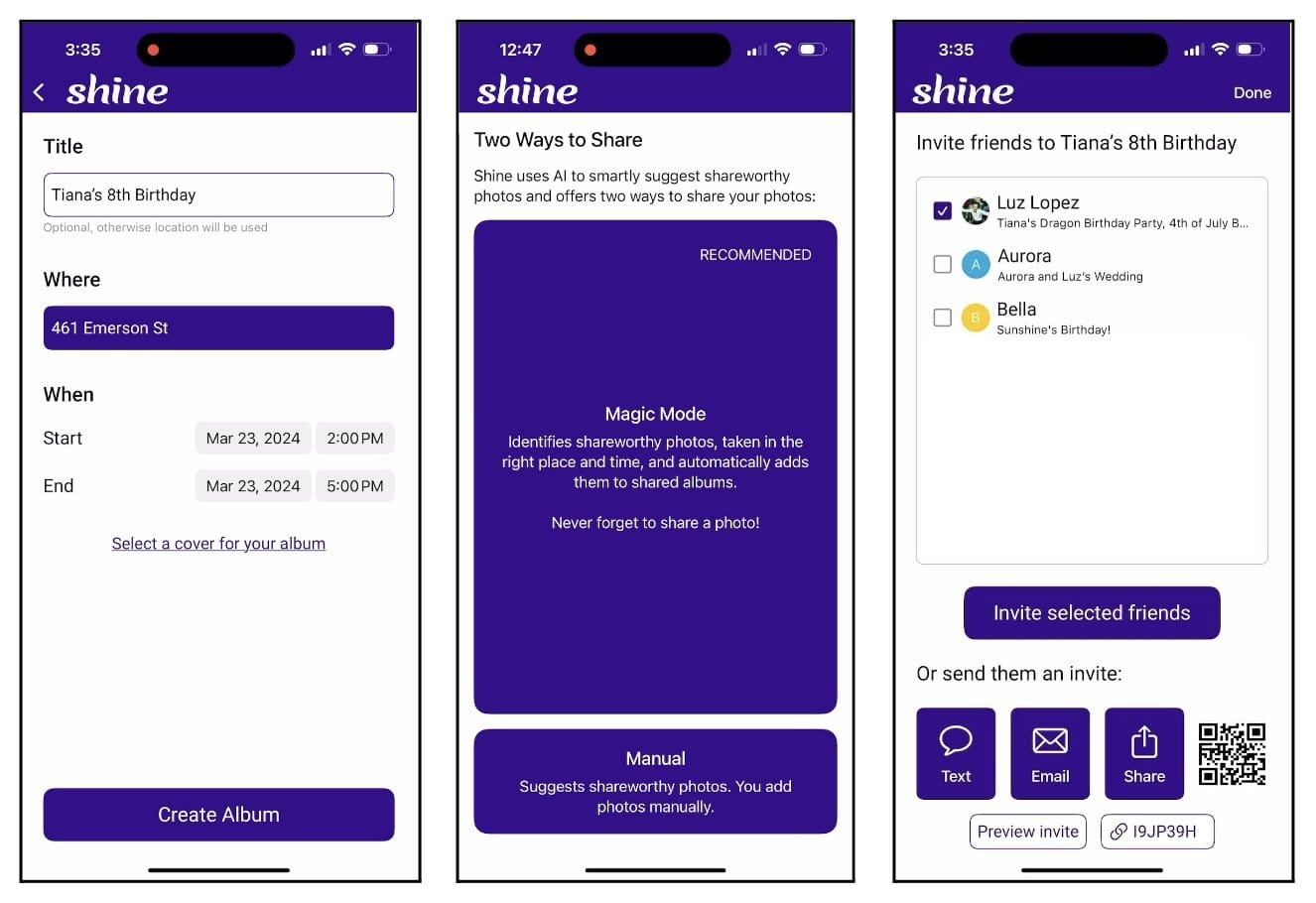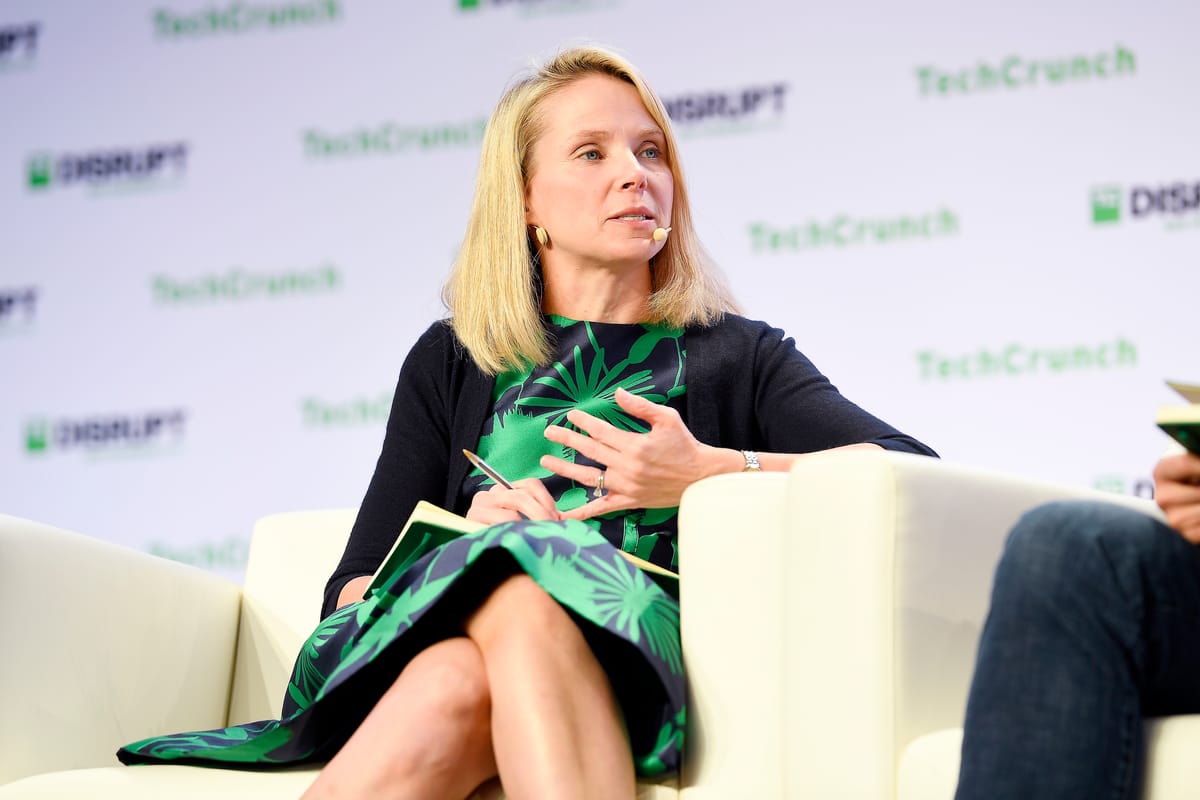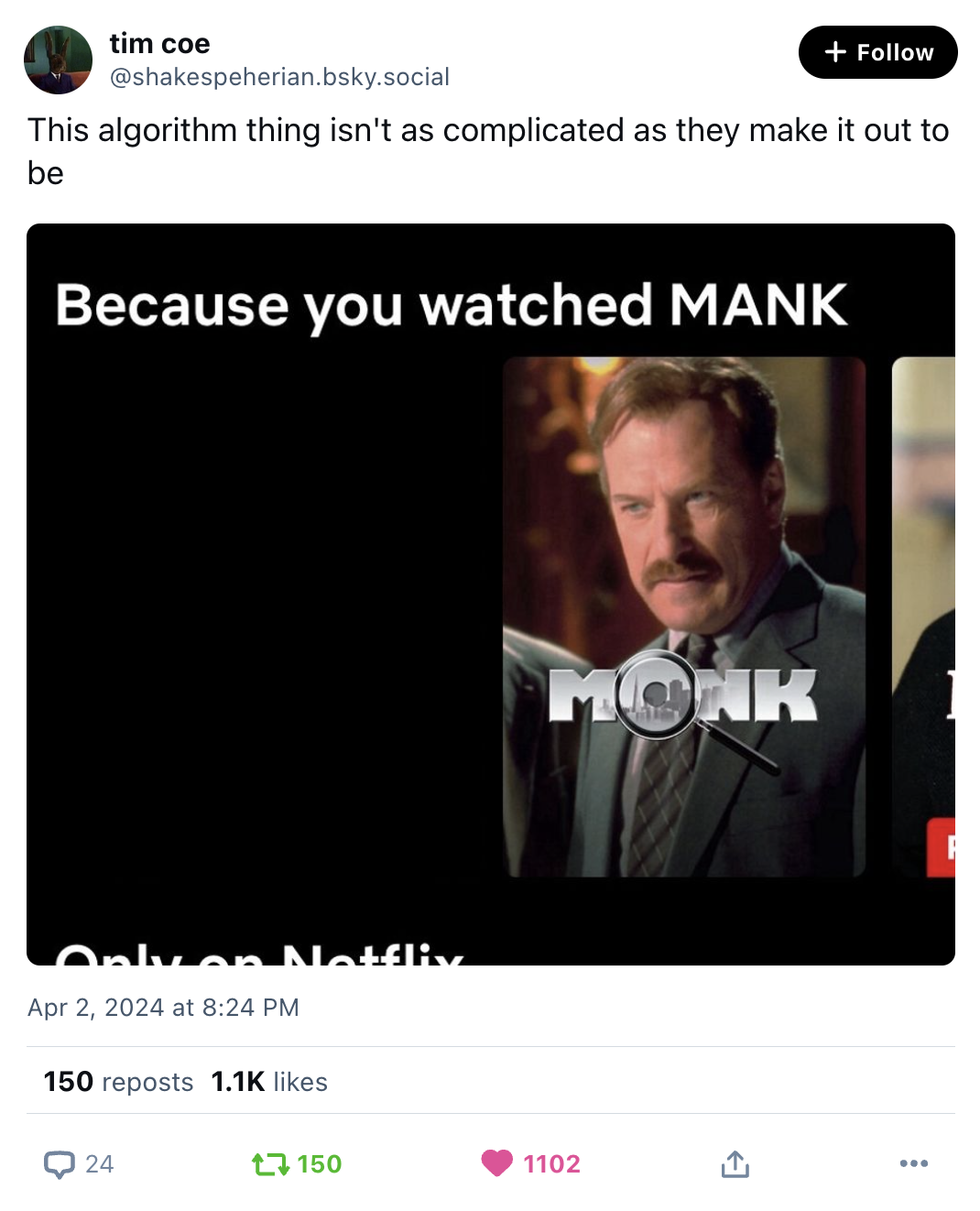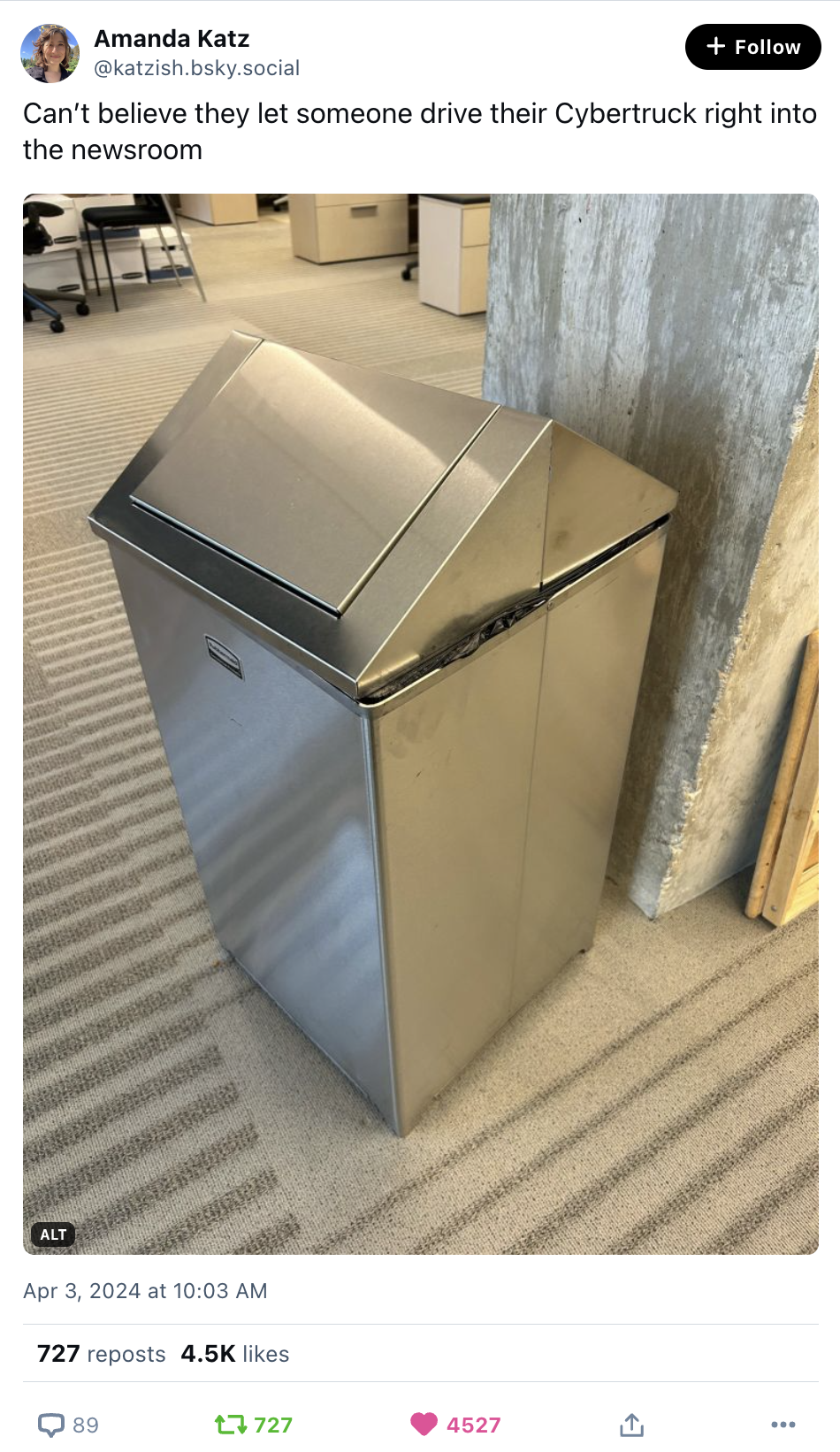|
Behind the 6-year-old startup's rocky launch of a photo-sharing app last week was a co-founder about to quit and months of employee warnings that its new project wasn’t ready
Here's this week's free edition of Platformer: a look inside Marissa Mayer's startup, Sunshine. Her cofounder quit this week after six years, days after the company's latest app was ridiculed for its barebones design and confusing features. We'll tell you how it all went wrong.
Do you value the sort of work we do around here? If so, consider upgrading your subscription today. We'll email you all our scoops first, and you'll be able to discuss each today's edition with us in our chatty Discord server.
I. For a brief moment in the tech world last week, it felt like 2012 again: a new photo sharing app had just launched, and everyone was talking about Marissa Mayer. Mayer, a prominent early Google employee who created its famed associate product manager program before leaving to become CEO of Yahoo, had returned with a new app from the startup studio she co-founded six years ago. Shine, an app designed to let people automatically share photos taken at events they attend together, was announced March 27 — and was immediately mocked by commentators for its bare-bones design and anachronistic feature set. “Whenever you feel like you're not good enough, always remember, the creator of the Associate Product Manager program at Google just dropped this,” wrote venture capitalist Deedy Das on X, alongside a screenshot of the app. In the office, employees placed bets on how many downloads the app would get on its first day. Mayer set hers high, at 12,000 (12 is her lucky number). But the actual number was closer to 1,000, Platformer has learned. This week, the company suffered another blow: Mayer’s co-founder, former Google and Yahoo executive Enrique Muñoz Torres, resigned. “Startup life is not easy, but it has been hands down the most rewarding experience in my professional career, which made my decision to leave a very tough one,” he wrote on LinkedIn. Until Wednesday, he was leading the development of an organizing app for families, which has yet to launch. Building a hit app is hugely challenging, and chaos is a common feature of many or even most of the startups that set out to build them. Sunshine, which Mayer founded with Muñoz Torres a year after leaving Yahoo, has been no exception, according to interviews with employees, who all asked for anonymity to speak publicly about the company. Mayer’s original idea had been to create simple utility apps powered by artificial intelligence. (She almost named the company Mundane AI, she told The Information last year.) In 2020, two years after the company launched under the name Lumi Labs, the pair announced the company’s first product: an app that promised to be “the world’s most advanced, intuitive contact manager,” according to The Verge. The company raised a $20 million seed round in 2020 from a small group of investors, including Mayer. At the end of that year, it officially rebranded as Sunshine. Despite high hopes, the contacts app has yet to take off. It was buggy at launch, duplicating contacts or introducing other errors into data fields. And it rattled some users by filling in contact information using public databases, raising privacy concerns. Sunshine eventually released an improved version of the app, but it hasn't managed to reach a critical mass of users. Last summer, Mayer laid off 20 percent of the company, leaving it with about 15 employees. She also went into brainstorming mode. Last summer, she had the idea for the app that would become Shine. Employees have been working on it ever since. But its path from concept to execution has been a rocky one. II. In October, Mayer threw a Halloween party at her house in Palo Alto. Mayer’s public Halloween bashes are famously lavish: complete with professionally carved pumpkins, jumbo bags of candy, and plush stuffed animals. The 2023 party was a quieter affair. Guests — a mix of friends and employees — gathered to carve pumpkins and test out a prototype of Shine, according to a former employee. Photo sharing became one of the most popular categories of apps in the early 2010s, as rapidly improving smartphone cameras and cellular networks led people to take more photos than ever before. Startups raced to build social networks around the feature, and the tech graveyard is now littered with the ones that didn’t make it: Path, Picplz, DailyBooth, and many more. One of the most famous flameouts in photo sharing was Color, which showed users every photo taken by fellow users in their immediate vicinity. The company raised $41 million — an eye-popping sum at the time — but got next to no traction, and eventually its engineering team was acquired by Apple in 2012 in a fire sale. To a degree that surprised employees, Shine sought to borrow ideas from Color. Like that app, it would ask users to share their location and photos with the app and with fellow users. When Shine users were nearby one another and snapping photos, Shine would automatically sort those photos into shared albums. “We’ll do Color, but we’ll have nudity filters so we’re not Color,” Mayer said, according to notes taken by the same former employee. (Color users used to troll each other by posting nudes, knowing that other people would see them when they opened the app.) Some staff members were skeptical. First, they worried that few people would be willing to grant the app permanent access to their location and to their photo libraries. Second, the team struggled to track users’ locations accurately enough to ensure that photos were shared as intended. Shine uses a Google API to track location, and it wasn’t always precise. Once, an employee found that photos of their daughter had inadvertently appeared in an album shared with colleagues, due to changes Sunshine made to its location parameters. Third, employees say there was little clarity about how Shine would compete. Apple and Google now have system-level features for sharing photos privately with friends and family. Mayer leads product development for the app — but if there is a product roadmap, she has largely kept it to herself. Employees say they learn what they are working on each week during Monday morning standup meetings, and that their mandate shifts frequently as Mayer changes priorities. They complain that Mayer often does not heed their advice, and say most product decisions are made based on Mayer’s own experiences using the app. While disarray in product development is common to many startups, in other ways Sunshine has been built to resemble a much older company. Employees are required to work in the office five days a week, and have an all-hands meeting that is scheduled for 5PM on Fridays. (During ski season, we’re told that the meeting has started as early as noon). But Mayer is often late to the meeting, employees say, extending their work into the weekend. When employees ask Mayer questions on Slack, employees say, she often prefers to answer them in person, delaying action. Sunshine manages its projects using Monday.com, but the app is not widely used internally, and in practice many projects are tracked on a white board, which the team calls “analog Monday.” “We honestly wanted to work hard, but the company is just so inefficient,” said the former employee. In any case, employee concerns about Shine proved to be mostly correct. After the party, during which few people gave the necessary permissions, Mayer agreed to try a different approach.  The Shine app III. After the Halloween party, Sunshine quietly made Shine available in Apple’s App Store. The requirement for users to permanently share their location with the app had been removed. Instead, it asked users to create or join individual events. If one Shine user created an event for a birthday party within the app, and another Shine user joined that event, the photos they took at the event would be shared with one another automatically. The app evolved as Mayer tested it out with friends and family on vacation or at parties, employees said. Product changes were “explicitly about her social life,” one employee said. In January, Mayer and her family went on a ski vacation in Wyoming. Mayer’s friend took some selfies on the trip — and was embarrassed when the photos automatically uploaded to a shared album on Shine, which Mayer had presumably created. When Mayer returned to the office, she told employees that photos taken with the front camera that only contained a single face should be excluded from shared albums. Inside the company, frustration was mounting. Mayer wanted to announce Shine in February, but the app was still light on features. Every week, it seemed, she came into the office with new ideas that employees had to rush to implement. And Mayer had laid off the app’s only designer in January, according to former colleagues, leaving it without strong visual direction. At times, Mayer’s design suggestions involved a simple line drawing on a piece of paper that her engineers had to struggle to interpret. When Shine finally did launch last week, commentators derided it for brutalist design, which seemed more appropriate to an app for filing expenses or recording timesheets. The most notable feature of its design was arguably its bright purple scheme, which many found reminiscent of Yahoo. (Mayer called the similarity “purely coincidental.”) The frosty reception to Shine, along with the departure of Muñoz Torres, has clouded Sunshine’s future. While there is undoubtedly some appetite for the utility apps that Mayer envisions, the company’s history of buggy launches and tumultuous product development has left some close to the company with serious doubts. Six years in, the startup has yet to find a large audience. Setbacks aside, work on both Sunshine and Shine continues. And earlier this week, in response to the criticism, Sunshine posted a mea culpa on X: “We heard you all loud and clear on Shine's design,” the company said. “We're excited to share that later this week, we'll be updating our UI to address the feedback raised by Design Twitter.” It was April Fool's Day, and the post included some joke screenshots of an even more brutalist-looking app. Later, the company called its own bluff. "We did hear your feedback and are currently working hard on a design that will make Shine's interface more modern," it said. This time, the company said, it was not joking.
More on the Grindr squeezeLast week we told you about Grindr’s plans to ramp up its effort to get users to pay for more features. We can now tell you that employees at high levels of the company are currently engaged in discussions about putting some chat features behind the paywall, Platformer has learned. Over the weekend, a bug restricted the number of free chats that users could send to people outside their geographic area through a feature called Explore. That bug has now been fixed, but while active it resulted in a surge of subscriptions — about 2,000 a day, compared to the typical 800. As a result, the company is now running a test to further restrict the number of free chats a user can send to someone outside their close vicinity, from three in a 24-hour period to as few as zero. Employees are tracking how these tests impact both subscription sign ups and user sentiment about the app — and will likely try to find a sweet spot between increasing the first without tanking the second. Today, about 19 percent of Grindr’s daily active users use the Explore feature. These tests are separate from Grindr’s discussions about paywalling chats more broadly, we’re told. So far, these discussions haven’t risen to the level of testing. But if the company continues to see sign ups surge after restricting free features, I wouldn’t be surprised to see aspects of the core chat function slip behind the paywall as well. — Zoë Schiffer
On the podcast this week: Kevin and I examine new studies on how AI may already be transforming the economy. Then, filmmaker Paul Trillo joins us to discuss how he used OpenAI's Sora to explore making movies with AI. And finally, Kevin catches me up on the incredible story of the XZ Utils vulnerability. Apple | Spotify | Stitcher | Amazon | Google | YouTube
Governing- An inside look at Jia Tan, the persona behind the XZ Utils supply chain vulnerability, who spent years building credibility and community before inserting malicious code. (Andy Greenberg and Mark Burgess / WIRED)
- The FCC plans to vote to reinstate net neutrality rules and resume oversight of broadband internet, which President Trump had rescinded. (David Shepardson / Reuters)
- Meta pushed back on an effort from the Federal Trade Commission to amend its 2020 consent decree with the agency, saying it had voluntarily disclosed two flaws in Messenger Kids app. (Leah Nylen / Bloomberg)
- The Threads account for the president of the United States, @potus, implemented Meta’s ActivityPub integration. That means Joe Biden is now officially part of the Fediverse. (Wes Davis / The Verge)
- The Oversight Board upheld Meta’s decision to let stand a video of a politician giving a speech that called for violence, shared by a news outlet in Pakistan, saying it falls under an exception to Facebook’s community standards for “awareness raising.” (Oversight Board)
- A majority of participants in Meta’s Community Forum on Generative AI thought AI had a positive impact, and that AI chatbots can be human-like if people are informed. These community governance experiments continue to be very cool. (Jennifer Broxmeyer / Meta)
- How Meta employees lost money on real estate investments promoted by a colleague in an internal messaging channel. Big yikes to this story. (Aisha Counts / Bloomberg)
- How a TikTok whistleblower’s improbable claims and allegations may have contributed to lawmakers’ determination to ban the app. (Louise Matsakis / WIRED)
- TikTok has bought at least $3.1 million of ads as part of a marketing blitz to counter a proposal to make ByteDance forcibly divest the app. (Sapna Maheshwari / New York Times)
- TikTok has struggled to moderate ads related to the Oct. 7 Hamas attack in Israel, with ads containing the word “hostage” being a hotly contested topic internally. (Alexandra S. Levine / Forbes)
- YouTube’s CEO Neal Mohan said that OpenAI would be violating the platform’s terms of service if it used YouTube videos to train Sora. Honestly I dare Google to sue OpenAI for training an LLM on other people's stuff. (Davey Alba and Emily Chang / Bloomberg)
- Google is introducing a new prototype feature for Chrome that uses encryption to prevent hackers from using cookies to hijack logins. (Michael Kan / PCMag)
- In an apparent first, a Washington state judge did not allow an AI-enhanced video to be introduced as evidence in a murder case. (Tim Stelloh / NBC News)
- Amazon’s plastic footprint is shrinking globally,ut has continued to grow in the United States, raising concerns. (Justine Calma / The Verge)
- Amazon sellers say they are overwhelmed with “return theft,” where people ship junk back instead of returned purchases. They say Amazon isn’t helping. (Sebastian Herrera / Wall Street Journal)
- Google is suing two app developers, accusing them of using the Play Store to push crypto romance scams. (Lauren Feiner / The Verge)
- Anthropic researchers found a new vulnerability in LLMs where the AI will reply to inappropriate questions after they ask it many harmless questions. (Devin Coldewey / TechCrunch)
- Oren Etzioni, a longtime AI optimist, founded a nonprofit that released free tools to help identify AI-generated disinformation. (Cade Metz and Tiffany Hsu / New York Times)
- A look at alternative iPhone app stores in the European Union, following Apple’s compliance with the Digital Markets Act. (Callum Booth / The Verge)
- The Israeli military reportedly used an AI-powered database, Lavender, to identify 37,000 potential targets with apparent links to Hamas. (Bethan McKernan and Harry Davies / The Guardian)
- X is rolling out Community Notes in India, ahead of this year’s elections. (Ivan Mehta / TechCrunch)
Industry- Despite user complaints, TikTok has no plans to dial back e-commerce content on the For You page, said Marni Levine, head of TikTok Shop’s US operations for small and medium businesses. (Erin Woo / The Information)
- X is giving out free Premium memberships to accounts with more than 2,500 verified followers, giving some blue check marks they didn’t ask for. (Amrita Khalid / The Verge)
- Elon Musk said he’s boosting pay for Tesla’s AI engineering team to fend off poaching from OpenAI. (Nick Turner and Craig Trudell / Bloomberg)
- Meta’s AI image generator declines to generate Asian people next to white people and leans into stereotypes, this analysis found. (Mia Sato / The Verge)
- Facebook’s mobile video player is getting a new vertical look, where Reels, Facebook Live, and longform videos will now all look like Reels and TikToks. (Amrita Khalid / The Verge)
- Meta apps, including WhatsApp and Instagram, were briefly down around the world yesterday. (Ben Schoon / 9to5Google)
- Meta’s chief technology officer Andrew Bosworth talks about where Meta is headed with the Quest 3, AI, and smart glasses a decade after the company acquired Oculus. (Scott Stein / CNET)
- Creators on Threads who get a significant amount of engagement on their posts may be eligible for cash payouts. Very curious to see how this gets structured; I do think creators on the app could use this kind of boost (Sydney Bradley and Dan Whateley / Business Insider)
- Google’s AI-powered Search Generative Experience is being tested in the United Kingdom. (Chris Vallance / BBC)
- Google is reportedly considering charging for “premium” AI features in Search. But the story is light on details. (Madhumita Murgia and Richard Waters / Financial Times)
- Google Books is indexing AI-generated books, which could impact Google Ngram viewer, a tool for researchers to track language. (Emanuel Maiberg / 404 Media)
- Google is reportedly considering making an offer for marketing software company HubSpot, which has a value of $35 billion. (Anirban Sen and Milana Vinn / Reuters)
- Apple is reportedly exploring personal robotics and directing teams to look into automated home devices. (Mark Gurman / Bloomberg)
- An Apple outage yesterday hit the App Store, Apple TV and Apple Music. (Richard Lawler / The Verge)
- Microsoft and Quantinuum announced a breakthrough in quantum error correction, an ongoing problem in quantum computing, saying the team was able to run over 14,000 experiments without an error. (Frederic Lardinois / TechCrunch)
- OpenAI is expanding its program that lets companies work with OpenAI researchers to train and optimize models. (Kyle Wiggers / TechCrunch)
- Paid ChatGPT users can now edit AI images created by DALL-E using text prompts. (Ina Fried / Axios)
- Stability AI’s new audio generation model, Stable Audio 2.0, now lets users generate songs that are up to three minutes long. The songs aren’t necessarily better, though. (Emilia David / The Verge)
- Web browser company Opera said it will allow users to download and use LLMs locally, starting with a rollout to Opera One users with developer stream updates. (Ivan Mehta / TechCrunch)
- AI startup Cohere is releasing a new AI model, which it says performs competitively with OpenAI’s on “business-critical” tasks, but at a lower cost. (Shirin Ghaffary / Bloomberg)
- Business schools are pushing graduate and undergraduate students to use AI as a tool. (Lindsay Ellis / Wall Street Journal)
- Patreon is now letting creators assign community members as moderators, similar to Reddit’s content moderation approach. (Mia Sato / The Verge)
- Spotify is reportedly raising prices in five markets, including the UK, and will raise prices in the US later this year. It’s also working on a slightly cheaper plan that doesn’t include audiobooks. (Lucas Shaw and Ashley Carman / Bloomberg)
- How Substack’s “follow” feature could set writers up to lose their followers in a Twitter-style implosion. (Andrea Grimes / Home with the Armadillo)
Those good postsFor more good posts every day, follow Casey’s Instagram stories. (Link) (Link) (Link)
Talk to usSend us tips, comments, questions, and event photos: casey@platformer.news and zoe@platformer.news.
|





